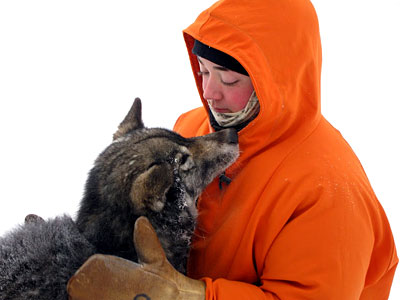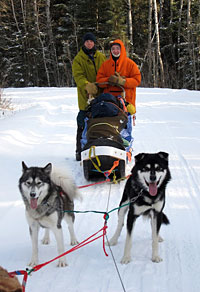Student instructors go to the dogs -- and learn to mush

"Ready, dogs? Let's go!" shouted anorak-clad musher Henry Wells '14. Six huskies, pulling a sled and provisions for a week, eagerly sprinted across an otherwise silent and frozen lake of northern Minnesota Jan. 15.
With Ithaca experiencing one of its mildest winters in recent memory, Wells was one of six instructors -- including three other Cornell undergraduates -- from Cornell Outdoor Education (COE) -- who sought out a new definition of cold. They spent a week of dogsledding, camping and skiing, Jan. 15-22, through the frozen Boundary Waters Canoe Area Wilderness in northern Minnesota.
The COE leaders were guided by three instructors from Outward Bound, the legendary wilderness education organization. Coming full circle, one of the Outward Bound instructors, Annie Socci '01, got her start in outdoor leadership as a COE instructor during her undergraduate years.

"My experiences as a COE instructor and student in college shaped me quite a bit and played into my decision to work for Outward Bound afterwards, so it is very special for me when two organizations I respect a great deal interface with one another," said Socci.
The group met at the Outward Bound base in Ely, Minn., where they prepared their winter camping systems and took a crash course in mushing on a dogsled. After a "practice" night under the stars in single-digit temperatures, the group of nine, 11 dogs and two sleds were dropped off at a trailhead miles from the nearest civilization.
Over the next five days, the group skied and mushed the sleds across frozen lakes and through dense spruce forests. The group spent the evenings caring for the dogs, setting up camp, chopping through foot-thick ice to get water and processing firewood. Temperatures dropped steadily throughout the trip, hitting a low of -20 F on the final morning of the expedition.
Expedition-weight down jackets and sleeping bags, provided by Outward Bound, captured body heat and kept the participants safe and largely cozy. Food became an important ritual, and bodies burned huge amounts of calories to stay warm. "But we won't travel when it's colder than 35 below," laughed Socci.
The COE instructors agree that one highlight of the trip was interacting with the dogs. "These dogs were born to pull," said David Dayan, a COE rock-climbing instructor. "One dog was so frantic to pull the sled when it stopped that he could move it on his own just by jerking on his line. But once they had their fill [of pulling] for the day, a lot of them wanted to play."
Another highlight was the mini-solo -- each student spent a night on their own. "We had a tarp, three meters of twine, two ski poles and whatever we could scavenge from the woods. It was amazing how self-reliant we learned to be," said Tara Ostock '13, a chemical engineering major. "It was real-world problem solving. ... Spending a night totally alone, in complete and utter silence was magical. Looking up at the stars -- you don't see stars like that back east ever."
The COE instructors, who also included Kate Orlofsky '12 and Drew Zukonsky '13, hope to put their new skills to use back in New York state. "One of my objectives was to feel more comfortable with winter camping," said Nicole Tedesco '04, a COE climbing instructor. "Single-digit temperatures in the Adirondacks are no longer intimidating ... though I'm sad that I can't bring the Outward Bound dogs on my next trip!"
Cornell Outdoor Education, one of the most comprehensive collegiate outdoor education programs in the country, uses challenge, adventure and outdoor experiences, with reflection and analysis, to help individuals and teams learn and grow.
Media Contact
Get Cornell news delivered right to your inbox.
Subscribe